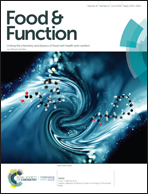Impact and consequences of dietary riboflavin deficiency treatment on flesh quality loss in on-growing grass carp (Ctenopharyngodon idella)
Abstract
Fish is among the cheapest and most promising sources of animal protein. The main edible portion of fish is muscle. This study explored the impact of dietary riboflavin on fish flesh quality and showed the possible role of muscle antioxidant defense in flesh quality in relation to dietary riboflavin. On-growing grass carp (initial average weight of 275.82 ± 0.57 g) were fed diets containing graded levels of riboflavin (0.63, 1.95, 3.98, 6.02, 7.96, and 10.04 mg kg−1 diet) for eight weeks. The results indicated that compared with the optimal riboflavin levels (3.98 and/or 6.02 mg riboflavin per kg diet), riboflavin deficiency treatment (0.63 mg riboflavin per kg diet) significantly reduced the muscle nutrients, including the protein, lipid, flavor amino acid, and total essential amino acid contents. Furthermore, the muscle shear force, pH value, and hydroxyproline concentration were reduced, while the muscle cooking loss and lactic acid content increased (P < 0.05). Compared with optimal riboflavin levels, the riboflavin deficiency treatment increased the reactive oxygen species (ROS), malondialdehyde (MDA), and protein carbonyl contents, while riboflavin treatments of 3.98–10.04 mg riboflavin per kg diet showed the lowest ROS and MDA contents (P < 0.05). Compared with the optimal riboflavin levels, the riboflavin deficiency treatment decreased the activities of copper/zinc superoxide dismutase (CuZnSOD), glutathione reductase (GR), catalase (CAT), and glutathione peroxidase (GPx), and reduced the glutathione (GSH) content (P < 0.05). Furthermore, the relative mRNA levels of antioxidant enzymes, including CuZnSOD, CAT, GR and GPx, and antioxidant-related signaling molecules, including NF-E2-related factor 2 (Nrf2) and casein kinase 2, were down-regulated, while those of Kelch-like ECH-associated protein 1b were up-regulated (P < 0.05). Collectively, the present study indicates that riboflavin deficiency treatment reduces the flesh quality, partly due to inhibition of the antioxidant defense through the Nrf2 signaling pathway, while optimal riboflavin levels reverse these negative effects.



 Please wait while we load your content...
Please wait while we load your content...